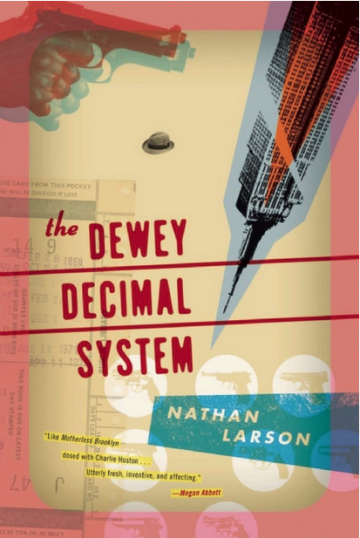The Dewey Decimal System by Nathan Larson
The hardboiled mystery is so familiar to readers and film viewers, it's become a platform for almost endless invention. With novels like A Scanner Darkly, Philip K. Dick may have been among the first to bend gritty noir in the direction of the unreal (in his case, by relocating it to a paranoiac futurescape), but he was hardly the last. From Jonathan Lethem's Gun, With Occasional Music and Motherless Brooklyn to Haruki Murakami's Hardboiled Wonderland and the End of the World to mind-bending films like Dark City and Memento, contemporary storytellers have pried apart the efficient machinery of the genre – its MacGuffins and femme fatales, its double-crosses and spare, snappy lingo – to cram in their own personal obsessions, formal innovations, and dreamlike imagery.
Nathan Larson's The Dewey Decimal System is a new entry in this formidable tradition. In a future New York still reeling from the “Occurences” of 2/14 – a coordinated attack involving bombs and germ warfare, which precipitated urban depopulation and the freefall of the economy – our narrator finds protection and a livelihood as a ruthless “freelancer” for the unelected and underqualified DA, “the little man behind the big desk.”
Effectively homeless and down to his last good suit, this anti-hero makes his home in the now largely abandoned reading room of the New York Public Library, where he takes on the seemly insurmountable task of rearranging the books there in accordance with the Dewey Decimal system... that is, when he's not out plying his trade as a cold-blooded hit man.Because of his book-organizing obsession, our protagonist has acquired the semi-official nickname “Dewey Decimal” (it even appears on his government paperwork), but the “System” of the title is no simple mode of classification. Dewey's system instead consists of a complex and, at times, seemingly nonsensical array of rules and rituals that he compulsively obeys.
And it's here that the novel's difficulties begin. Rather than making a single, defining decision about the novel's main character, Larson goes for broke, opting for nearly every bizarre idiosyncrasy he can. A Scanner Darkly gave us a would-be sleuth befuddled by drug addiction; Memento delivered exposition in a way that mirrored the protagonist's memory loss; Motherless Brooklyn cracked the classic gumshoe's invulnerable façade by reimagining him as governed by Tourettic compulsions. But The Dewey Decimal System does all of the above – and then some.
Dewey is tormented by dreams of killing his wife and child, although he's not even sure he ever had a wife and child – nor is he sure of any other memory of his past, since he believes he had true memories erased and false memories implanted during an “(illegal, mind you) detention at Walter Reed Medical Center” by the US government. For reasons not explained, he's fluent in a wide variety of languages (Ukrainian, Serbian, Cantonese, among others) but still has gaps in his knowledge (he doesn't speak Latvian, for example). He carries a key in his pocket that he touches compulsively. He pops pills prescribed to him by the state with alarming frequency – and finds himself reduced to quivering helplessness when he exhausts his stash – and smokes almost as often.
He eats pistachios, saves and disinfects the shells, then scatters them. He constantly sanitizes his hands with Purell. He makes only left turns prior to 11 a.m. And his use of the subway is governed by byzantine precepts: “When riding the New York City subway, it's essential to begin with letter trains (A, B, C) and then only in alphabetical order. If traveling more than four stops, it's essential to transfer to a number train (1, 2, 3), and in a perfect world the first transfer should be an even number... Late afternoons, the rules flip: necessary to take number trains and, if need be, transfer then to the lettered ones.” It's a good thing that, as he puts it, he has a map of the city tattooed on the inside of his eyelids.
Presented with such an assortment of strange behaviors, my first question is why. But that's not a question that Dewey as a narrator (or Larson as an author) ever directly addresses. This book is the first in a series, so I can appreciate that Larson wants to sustain tension and mystery by withholding key elements of Dewey's backstory – the full explanation of how he became the way he is. The problem is that Dewey's behavior doesn't make much emotional sense. Since Dewey is the narrator, I approached this novel with an expectation that I would either have access to his inner world – or that, if he's unreliable, he would have some agenda, some perspective he's trying to sell. But instead, Dewey is remarkably cagey in sharing what he knows, or if, in fact, he knows it at all.
What is the System? Why does he allow the System to govern his life? Are there connections, real or imagined, among its disparate elements – the nutshells and books, the pills and Purell? And in what sense is it a “moral code,” as he says in one of the later chapters? If Dewey isn't sure, he could at least give us the fullest explanation he can. Lionel Essrog, the narrator of Motherless Brooklyn, isn't a medical expert, but he's able to convey his own experience of having Tourette's, and the man inside the swarm of symptoms is therefore visible to us. With Dewey, though, it's not only tough to understand who he is, but what he wants. He tantalizes the reader with clues about his past, yet he doesn't seek the truth himself (presumably because the nightmares have him afraid of what he'll discover); at the end of the novel, he even burns the evidence of his real story and identity when he has the opportunity to uncover it. So what is he after?
The book's plot concerns a hit job: Rosenblatt, the DA, hires Dewey to take out a Ukrainian mobster called Shapsko in what at first appears to be a union-busting operation. The job quickly expands to entangle Shapsko's alluring yet elusive wife Iveta, the FBI, and a whole bunch of gun-toting Serbians. Throughout, Dewey's one constant motivation is Iveta: she's gorgeous, and after they meet cute – he breaks into her house, but she courteously shoots him nonfatally despite the point blank distance – he finds himself spellbound: “Has she been off my mind? Not for a half minute.” But even though his attraction to her drives the action, it isn't explored on the page; we don't know what he hopes for from her, or why we should care.
At one point late in the book, Dewey declines to take a clear shot at Shapsko because, he thinks, “Something's not right, something's off.” Accordingly he goes searching for Iveta: “That pulp cliché, the oldest of the old, the most tired of all tired phrases comes to me. But I dig the truth at its core. When in doubt, look for the girl. Cherchez la femme.” Still, when she saves him from a rogue FBI agent and brings him home, he's inclined to believe every sob story she offers, regardless of how dubious they seem – incongruous, considering he's already pegged her for a femme fatale.
Despite these contradictions, though, Dewey does have one quality that sets him – and the book – apart: his thinking on race, and physical appearance in general. As a person of color, with “mixed ethnicity,” he has tough words for a supposedly post-racial era. And he's acutely aware of his own biases. When he meets an Eastern European moll made uncanny by an excess of plastic surgery, he's quick to offer the usual tough-talking noir quips (“she joins that subspecies of humans that... all look strangely like the same person”) before doing a double take. “I suddenly feel a rush of sympathy for this person,” he tells us. “I've been assuming things. Like the fact that the plastic surgery was her choice. I know when people assume shit about me, I don't like it.” It's this one trait that humanizes Dewey, simply because it comes from a psychologically consistent place.
The Dewey Decimal System is an engaging read, filled with action sequences worthy of a Scorsese film and swift, acid prose. I'm curious to see how Larson's vision of a dystopian New York continues to develop over the coming books in the series. But so far at least, I don't quite see the method to Dewey's many madnesses.
Nathan Larson is a musician and film composer. The Dewey Decimal System is his first novel.

 Chandler Klang Smith's genre-bending novel The Sky Is Yours (Hogarth/Penguin RH, 2018) was listed as a best book of 2018 by The Wall Street Journal, New York Public Library, Locus, LitHub, Mental Floss, and NPR, which described it as "a wickedly satirical synthesis that underlines just how fractured our own realities can be during periods of fear, unrest, inequality and instability." Chandler has an MFA in creative writing from Columbia University. She has served twice as a juror for the Shirley Jackson Awards, worked in book publishing and as a ghostwriter, and currently teaches creative writing at Sarah Lawrence College.
Chandler Klang Smith's genre-bending novel The Sky Is Yours (Hogarth/Penguin RH, 2018) was listed as a best book of 2018 by The Wall Street Journal, New York Public Library, Locus, LitHub, Mental Floss, and NPR, which described it as "a wickedly satirical synthesis that underlines just how fractured our own realities can be during periods of fear, unrest, inequality and instability." Chandler has an MFA in creative writing from Columbia University. She has served twice as a juror for the Shirley Jackson Awards, worked in book publishing and as a ghostwriter, and currently teaches creative writing at Sarah Lawrence College. 